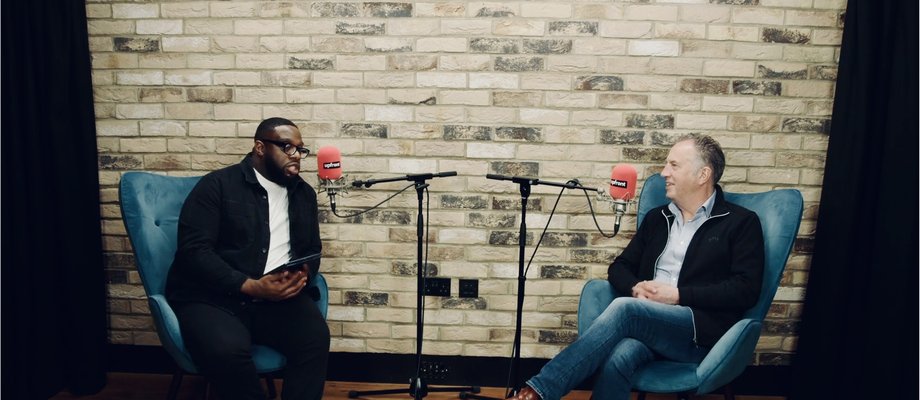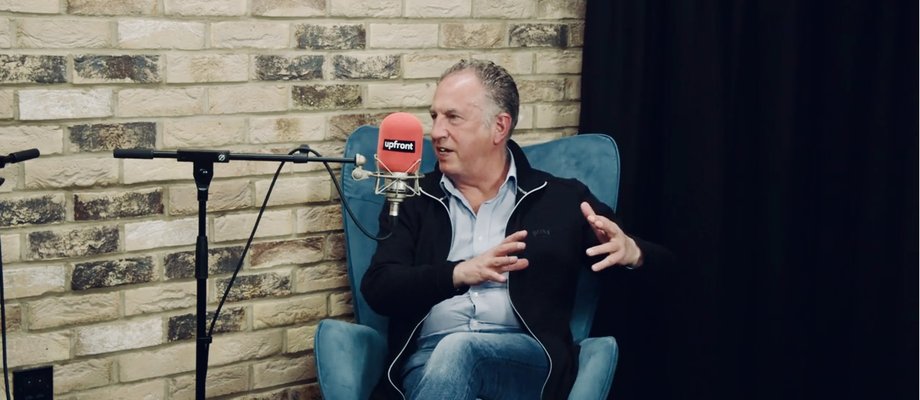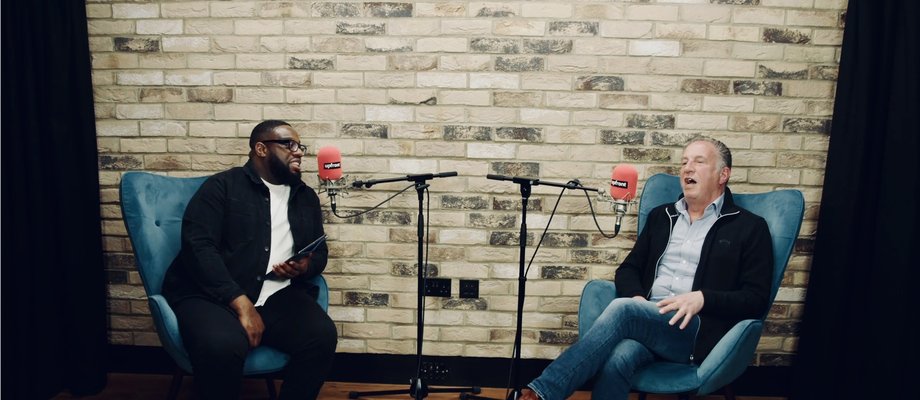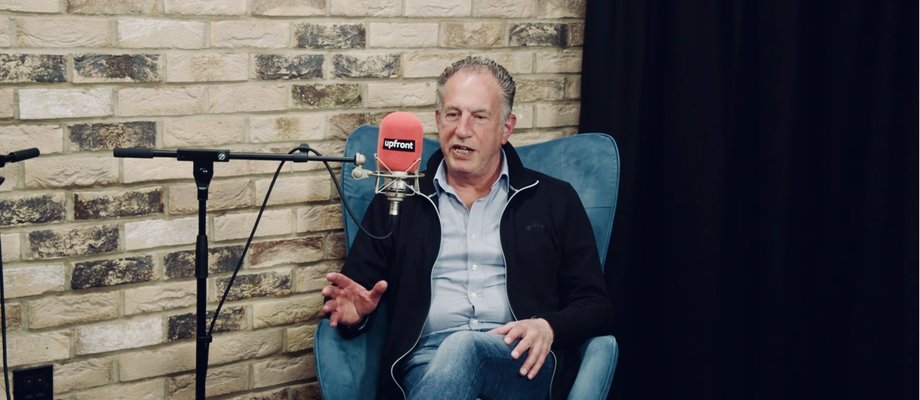In the second episode of the new series of the Upfront podcast, financial adviser Emmanuel Asuquo talks to financial advice marketing expert Philip Calvert about how to grow your income and your client base.
Here are some highlights from that conversation. Listen to the episode in full here.
Upfront Series 3, Episode 2 - Show notes
Emmanuel: Now, if you're a financial adviser like me, you could spend as much as 60-70% of your time on non-revenue-generating activities. That's crazy. So in today's episode we're gonna look at how we can make the most of the time we do have for revenue generation and get some ideas on how to generate leads and new business without too much effort. Here to help us so that is financial advice marketing expert, Philip Calvert. So Phil, we're going to go straight into it. What do the most successful financial advisers do differently? What's their secret?
Phil: I think it comes down to education. A lot of consumers need professional help in terms of understanding personal finances, whether that's a basic level or maybe something much more sophisticated for really high net-worth people. And the financial advisers that I see really cracking this nut are going for the education piece.

Emmanuel: So, what are the habits of some of the most successful financial advisers you've met?
Phil: In the mid-to-late 1980s, I worked as a broker rep for a life office. One adviser was chucking business at me like you wouldn't believe. I had the sense to ask him, How do you do this? And he says, well, the secret is, I look after small business owners in Southwest London. All these people network together. They go to the same golf and tennis clubs, so they all know each other. And so I've done well on word of mouth and referrals, but whenever I was with them, I would always say, Would it be okay if I did a presentation to your team at some point? And they would always say yes. So he'd be doing these 20-minute presentations to the staff, but he had a handout, and the handout was the key. It was a large postcard with five questions about people's personal finances, and he would say to people, Hey, I hope you enjoy the presentation today. If you could fill out the postcard and put your name and address on it before I go, I'll pick one randomly, and someone will get a bottle of wine. And he'd do his presentation. He'd pick up all the postcards, go home, and then send a personalised letter to everyone who had filled in the postcard, which was everybody in the room. The questions were real personal finance basics like, are you a regular saver? What would happen if you were hit by a bus tonight? Five simple questions and then the personalised letter would go, Hey Mr. or Mrs. Jones, hope you enjoyed the presentation. Sorry, you didn't win the bottle of wine. I noticed from your answers on the postcard that you're a regular saver. That's really good. Keep that going. But I also noticed that you said if you were hit by a bus tonight, there'd be a problem. And then he'd say, would you like some help with that? He said his take-up rate was almost a hundred percent.
Financial advisers who are doing really well are the ones who have this magic combination of collecting data and doing live events or webinars.
Financial advice marketing expert
Emmanuel: Wow.
Phil : He was basically collecting data. Now, this was back in the mid-to-late eighties. And if I look at financial advisers today who are doing well, it's the ones who have this magic combination of collecting data and doing live events or webinars as well.
Emmanuel: I love that. As a financial adviser, I feel like all we do today is collect data. Sometimes, we collect so much data that I feel like I know my client too well. I know too much information, but it's how do we convert it. Now, let's talk about one of advisers' favourite buzzwords - lead gen. How can they do it effectively?

Phil: I've got an online community for financial advisers that's been going for 20 years. But the topic that comes up more than anything else is lead gen. I would say 10 per cent of IFA and financial planning firms have got lead gen nailed. They know what works for them. There's a guy, Keith Churchhouse, Chapters Financial in Guilford. He has a two-pronged approach to his lead gen. One, he sponsors roundabouts in Guilford. He's very savvy about which roundabouts he sponsors. Some of his roundabouts get 80,000 eyeballs a week going past them. But what he also does is he appears on local BBC radio once a month. He goes in, and they do a phone-in on personal finance. So, you know, we're doing a podcast, audio works, radio advertising works, radio interviews just work. And there are lots of psychological reasons why they're so effective. That combination where people see his name on a roundabout and hear his name on the radio is very, very powerful. So, referrals are still a big thing and work well. If you have a referral mindset and strategy, you need never worry about marketing ever again. Old school stuff still works today but top of the tree is seminars.
I would say that 10% of IFA and financial planning firms have nailed their lead gen.
Financial advice marketing expert
Emmanuel: Yes!
Phil: I can convince any adviser they should be putting on seminars, but I know in the back of their mind they're thinking, how do we get bums on seats, and I'm not sure I want to do the presentations or something like that. Just get over it. Just do it. There's a process to getting a room full of people. And I think when I say to an adviser you should put on seminars locally, they also start thinking, well, how am I going to get a hundred people to turn up? And I'm thinking, don't go for a hundred people. Start with five
Emmanuel: Yes!
Phil: And take the win.

Emmanuel: My first seminar, I struggled to get five people in there. Most of them were my family members. But I delivered that seminar like I was delivering it to 100 people. I used it. I learned. I got feedback. I did it again. It's got 25 people, so I did it again. Got 50 people. Now I get 100 people in a seminar. I could do more. It sells out within a few days. And, like you said, when people see you stand up there, they buy into you as a person. You are an expert.
Phil: But here's the other thing: if you've got 10 people in a room, 20 people in a room, a hundred people in a room, there's a fair chance that several of those people will tell their friends about you. A lot of advisers just see their role as doing the financial plan. That's all they do. Yet all this expertise, experience, knowledge, and credibility can be taken out, repackaged, and turned into other things that people will pay for.
My first seminar, I struggled to get five people. Now I get 100 people and could do more.
Host
Emmanuel: So tell me then, do you think financial advisers are stuck doing too many activities that don't generate income? And, if you do, how can they get out of this pattern?
Phil: I think the answer is, undoubtedly, yes. I'd like to see financial advisers becoming a bit more entrepreneurial, which means thinking outside the box a bit. Take your expertise and be entrepreneurial with it, and don't be afraid to play around with how you can do that. Financial planning is one of those concepts that a lot of people don't really get until they've experienced it. There's a huge opportunity for advice firms to be a bit more entrepreneurial. Give people the opportunity to experience your expertise, and they will pay for it.
Emmanuel: Talk to us about AI because if there was ever anything that gets advisers quaking in their boots, feeling like they're about to be replaced, it's AI. How can it help advisers as opposed to being a hindrance?

Phil: Advisers seem to fall into two or three different camps. There's quite a small percentage, admittedly, who were the proper early adopters who dived into it and created suitability letters the day after ChatGPT launched. And there's also a huge number of advisers who go, okay, I recognise AI as a thing, and when it arrives in two years, I'll start paying attention. So there's this idea that AI is a couple of years away. Now that's a real problem. If you still think AI is something that's coming down the track, then you have no hope. Genuinely have no hope. Of course, it's going to impact our businesses in a whole bunch of different ways, but let's throw this back to marketing. AI is the answer to their prayers. AI can get the marketing work done that they've either been putting off or haven't had the resource for. It's like having a completely free new member of staff in your building. This idea that it's some way off and it's going to impact us in the future, forget it. You're, you're toast now if that's your attitude. But the advisers who are smart about it and they think about it strategically are gonna fly. So, AI won't necessarily put you out of business, but another financial adviser using it will.
AI won't necessarily put you out of business, but a financial adviser using it will.
Financial advice marketing expert
Emmanuel: I'm going to challenge you to give us some real quick wins. What can advisers do to increase their income?
Phil: Put that entrepreneurial hat on. Start thinking about how you can take the expertise you've got and turn it into something else. Create some online courses. Super easy to do. Just go to Udemy and model what you're seeing there. And ChatGPT is your friend and will help you create that, even videos if you want to do videos as well. Be brave enough to charge for those videos. And, if you get some traction on that, you can start thinking about who is buying these videos, and you may have a completely new business model or a separate one you can run alongside.

Emmanuel: That's amazing. I love that. I'll add another one, which is a book. See a book more as a business card. Think about 10 things, 10 problems you hear all the time as an adviser with your clients. Write down the answers to them and create them into a book that people can download and you can give out. People will read it, and I promise you they'll come back to you.
Phil: Yeah, it's the best business card you'll ever give out.
Emmanuel: Phil, thank you so much for being here. I've thoroughly enjoyed our conversation. I know that the advisers listening would have learned some stuff and had takeaways. So thank you for sharing, and keep up the amazing work.
Listen to this episode here or wherever you get your podcasts.
Meet our guest
Philip Calvert
Phil has worked with financial advisers for over forty-five years, both in senior provider roles and as an independent marketing consultant. He founded LifeTalk - the original online community for advisers, and more recently, the Adviser Growth Community. Phil is the author of multiple books on marketing, lead generation and AI for advisers and has presented to over a million advice professionals worldwide.
Loved this?
Then listen up
Upfront is the award-winning podcast for the financial services industry brought to you by Iress. Series 3 is out now, featuring 10 brand new episodes and conversations that everyone working in financial services needs to hear. Listen to Upfront on your favourite podcast app and follow so you never miss an episode.





